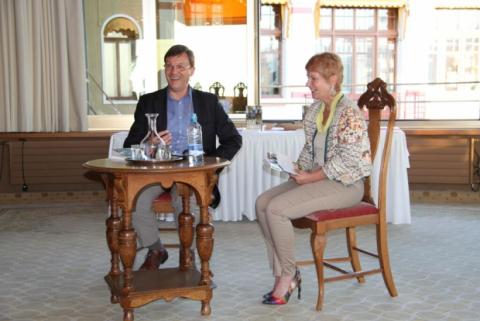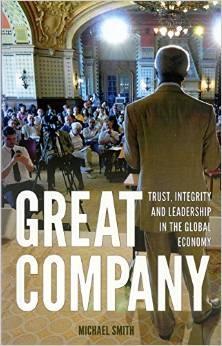
by Doris Okenwa
Journalist and author Michael Smith urged the need for ‘conscience-based decision-making’ in banking, business and the economy when he launched his new book Great Company at the Caux Conference Centre in Switzerland, on 28 June. He was interviewed in front of conference participants by South African whistleblower Wendy Addison, whose story is one of many in the book, during the annual Caux conference on Trust and Integrity in the Global Economy (TIGE).

Smith said he had written the book out of ‘appreciation and celebration for all the people who have told their stories here in recent years. The book is not really my book but their book, their stories.’ They are of people who have stepped outside ‘the Machiavellian notion that the end justifies the means’. Rather, Smith argues, the means determine the ends, as the financial crash of 2008 so dramatically illustrated. ‘The way we do things is as important as what we do,’ he said.
As well as the annual TIGE conferences, in the Swiss Alpine village of Caux, the book also draws on the Asian work of Caux Initiatives for Business (CIB) and its international conferences held biennially at Asia Plateau, the Indian centre of Initiatives of Change.
Great Company is as much about the geography and psychology of capitalism as it is about conscience, courage and integrity. It is his third book on this theme and the first since the financial crash. Since then, Smith says, ‘the evidence of the extraordinary power of human and, indeed, spiritual motivation to change things for the better has been surprising.’ He gives the narratives of those who have shown integrity and leadership in an era when profit at all cost too easily dominate business models.
Social entrepreneurs are naturally motivated by a sense of social conscience. But what about personal conscience, he asked. The lack of it had led to currency manipulations, Ponzi schemes and corruption. We needed to rediscover the moral philosophy of Adam Smith, the founding father of economic thought.

Two chapters are dedicated to banking, the financial crisis and its consequences. ‘We all remember 9/11,’ he said, ‘but we should equally remember 9/15/2012 which saw the crash of Lehman Brothers.’ That was the nadir of the financial crash, which pushed 100 million people into poverty. It is time for organizations to rethink their purpose ‘beyond maximizing returns’, Smith said. He quotes bankers of conviction who call for ‘a whole new culture of customer, community, character and care’. Banks had lost their ‘sense of stewardship and service to customers and the wider community.’
Smith, who is Head of Business Programmes at Initiatives of Change UK, dedicates a chapter to ‘beheading the snake of corruption’. Much of the book is concerned with showing that character and personal conviction to do the right thing are needed. This is not just a talking-shop for Smith. Rather, he tells stories of personal transformation as a sign that alternative models abound beyond the bottom line of shareholder value. He outlines five pillars of trust as a starting point: purpose, sustainability, stewardship, cooperation and integrity. From the personal stories of international hotelier Lawrence Bloom, who helped to transform the environmental impact of the global hotel industry, to whistleblower Wendy Addison, involved in the largest corporate collapse in South African history, character and choice stand out.

Such individuals show that it is possible for executives and organizations to move from ‘acquisition to contribution’, Smith said. ‘These are stories that have had an impact on economic transformation.’ This can also be observed in the rise of social enterprises and other economic models mandated to serve the common good. A paradigm shift is taking place in the world from Corporate Social Responsibility to Corporate Sustainability.
Family background played a part in why Smith wrote the book. His great-great grandfather had founded a woolen textile mill in Bradford, Yorkshire. But international competition combined with unwise decision-making had seen the liquidation of the company in the 1950s. Smith reflected on ‘human motivations in running an organization, which create destinies. There is a huge price to pay for the wrong tone at the top,’ he said.
Journalists, he concluded, are encouraged to be skeptical if not cynical. ‘But there is room for a journalism of appreciation and encouragement. This is what the stories of TIGE are about.’ They needed to be globalized.
